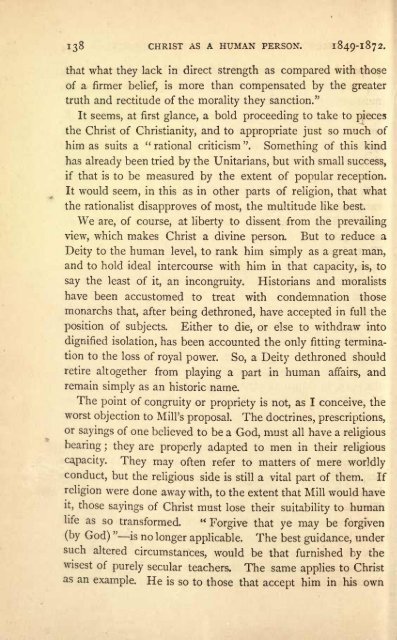John Stuart Mill: A Criticism with Personal Recollections
John Stuart Mill: A Criticism with Personal Recollections
John Stuart Mill: A Criticism with Personal Recollections
Create successful ePaper yourself
Turn your PDF publications into a flip-book with our unique Google optimized e-Paper software.
138 CHRIST AS A HUMAN PERSON. 1849-1872.<br />
that what they lack in direct strength as compared <strong>with</strong> those<br />
of a firmer belief, is more than compensated by the greater<br />
truth and rectitude of the morality they sanction."<br />
It seems, at first glance, a bold proceeding to take to pieces<br />
the Christ of Christianity, and to appropriate just so much of<br />
him as suits a<br />
"<br />
rational criticism ". Something of this kind<br />
has already been tried by the Unitarians, but <strong>with</strong> small success,<br />
if that is to be measured by the extent of popular reception.<br />
It would seem, in this as in other parts of religion, that what<br />
the rationalist disapproves of most, the multitude like best.<br />
We are, of course, at liberty to dissent from the prevailing<br />
view, which makes Christ a divine person. But to reduce a<br />
Deity to the human level, to rank him simply as a great man,<br />
and to hold ideal intercourse <strong>with</strong> him in that capacity, is, to<br />
say the least of it, an incongruity. Historians and moralists<br />
have been accustomed to treat <strong>with</strong> condemnation those<br />
monarchs that, after being dethroned, have accepted in full the<br />
position of subjects. Either to die, or else to <strong>with</strong>draw into<br />
dignified isolation, has been accounted the only fitting termina<br />
tion to the loss of royal power. So, a Deity dethroned should<br />
retire altogether from playing a part in human affairs, and<br />
remain simply as an historic name.<br />
The point of congruity or propriety is not, as I conceive, the<br />
worst objection to <strong>Mill</strong> s proposal. The doctrines, prescriptions,<br />
or sayings of one believed to be a God, must all have a religious<br />
bearing ; they are properly adapted to men in their religious<br />
capacity. They may often refer to matters of mere worldly<br />
conduct, but the religious side is still a vital part of them. If<br />
religion were done away <strong>with</strong>, to the extent that <strong>Mill</strong> would have<br />
it, those sayings of Christ must lose their suitability to human<br />
life as so transformed.<br />
"<br />
Forgive that ye may be forgiven<br />
"<br />
(by God) is no longer applicable. The best guidance, under<br />
such altered<br />
circumstances, would be that furnished by the<br />
wisest of purely secular teachers. The same applies to Christ<br />
as an example. He is so to those that accept him in his own

















